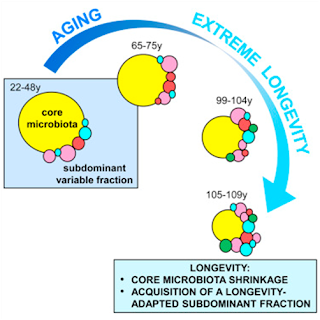अमरत्व की ओर जारी (4)
Author : Dr. P. D.GUPTA
Former Director Grade Scientist, Centre for Cellular and Molecular Biology, Hyderabad, India
www.daylife.page
Longevity is a combination of health and lifespan that is determined by a variety of factors. Bacteria are integral to the early development of the immune system, both in terms of its physical components and its function, and continue to play a role later in life in its operation. Lifestyle and environmental effects on the microbes which can go both ways; delay (healthy ageing) or accelerate (unhealthy ageing) deterioration in the host and foreshorten life expectancy. Age-related changes in the microbes are highly variable, influenced by both personal and external environmental factors.
Growing research suggests that gut microbes (bacteria, fungi, viruses) are involved not only in all aspects of body function, but also in healthy aging. New findings show that the gut microbes could help in increasing our age by strengthening immune and cognitive (related to. thinking, reasoning, remembering, imagining and learning) functions
The number of years we have been alive (known as chronological age) is a non-modifiable number, since it depends on earth’s rotation around the sun. However, biological age is different from the number of candles on your birthday cake and it is possible for us to modulate it. Aging healthily is possible, by taking care of our gut microbes. Considering the gut microbes as a factor that affects health and longevity is by no means a new idea. Elie Metchnikoff, considered the father of probiotics, proposed more than a century ago that targeting the gut by consuming lactic acid bacteria, such as those found in curd, could delay the onset of cognitive decline associated with aging. But unfortunately, it was ignored by scientists as well.
Fortunately, scientists have again taken up this research and gave remarkable clues on the subject. For example, the gut microbes change as we age. To begin with we get seeds of microbes from mother’s womb and after birth through mother’s milk. After solid foods are introduced in early life, the gut microbes gradually change and tend to remain quite stable. But in older adulthood—approximately after age 60-65—gut microbes diversity generally begins to decrease, while enrichment of previously non-dominant bacteria (e.g., potentially pro-inflammatory bacterial groups) and a drop in the number of beneficial strains occur.
Recent studies in centenarians have revealed that age-related changes in the gut microbes are not a trivial matter, given that those changes are related to frailty and overall physical health. It was also shown that diet and nutrition strongly impact microbes alterations in seniors.
For example, scientists have figured out that people from Japan with an average age of 107 have a distinct gut microbes that is enriched in microorganisms involved in generating unique and previously unknown bile acids—compounds in bile that aid in fat digestion—that have antimicrobial properties, in particular against a type of bacteria (Clostridioides difficile), which causes severe diarrhoea and colitis.
“Longevity adaptation” seems to involve enrichment in health-associated gut bacteria. Longevity is a complex trait in which genetics, environment, and stochasticity concur to determine the chance to reach 100 or more years of age. Because of its impact on human metabolism and immunology, the gut microbes has been proposed as a possible determinant of healthy aging 105–109 years old, in comparison to adults, elderly, and centenarians, thus reconstructing the longest available human microbes trajectory along aging. We highlighted the presence of core microbes of highly occurring, symbiotic bacteria with a cumulative abundance decreasing along with age. Aging is characterized by an increasing different type of bacteria, as well as a rearrangement in their co-occurrence network. These features are maintained in longevity and extreme longevity, but peculiarities emerged, especially in semi-super-centenarians, describing changes that, even accommodating opportunistic bacteria, might possibly support health maintenance during aging, such as an enrichment and/or higher prevalence of health-associated groups (see figure below).(The author has his own study and views)
To be continued... in next article...






